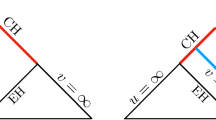Abstract
We present a computational framework (Rio) in the ADM 3+1 approach for numerical relativity. This work enables us to carry out high resolution calculations for initial data of two arbitrary black holes. We use the transverse conformal treatment, the Bowen–York and the puncture methods. For the numerical solution of the Hamiltonian constraint we use the domain decomposition and the spectral decomposition of Galerkin–Collocation. The nonlinear numerical code solves the set of equations for the spectral modes using the standard Newton–Raphson method, LU decomposition and Gaussian quadratures. We show the convergence of the Rio code. This code allows for easy deployment of large calculations. We show how the spin of one of the black holes is manifest in the conformal factor.






Similar content being viewed by others
References
Abbott, B.P., et al.: Phys. Rev. Lett. 116, 061102 (2016)
Abbott, B.P., et al.: Phys. Rev. Lett. 116, 241103 (2016)
Abbott, B.P., et al.: Phys. Rev. Lett. 118, 221101 (2017)
Abbott, B.P., et al.: Phys. Rev. Lett. 119, 141101 (2017)
Yang, H., Paschalidis, V., Yagi, K., Lehner, L., Pretorius, F., Yunes, N.: Phys. Rev. D 97, 024049 (2018)
Abbot, B.P., et al.: Phys. Rev. Lett. 119, 161101 (2017)
Abbot, B.P., et al.: Astrophys. J. Lett. 848, L12 (2017)
Clark, M., Laguna, P.: Phys. Rev. D 94, 064058 (2016)
Healy, J., Lousto, C. O., Zlochower, Y., Campanelli, M.: The RIT binary black hole simulations catalog, arXiv:1703.03423
Maselli, A., Kokkotas, K., Laguna, P.: Phys. Rev. D 95, 104026 (2017)
Thomas, J.W.: Numerical Partial Differential Equations: Finite Difference Methods. Springer, Berlin (1998)
Thomas, J.W.: Conservation Laws and Elliptic Equations. Springer, Berlin (1999)
Press, W.H., Teukolsky, S.A., Vetterling, W.T., Flannery, B.P.: Numerical Recipes in FORTRAN. The Art of Scientific Computing. Cambridge University Press, Cambridge (1992)
Baumgarte, T.W., Shapiro, S.L.: Numerical Relativity: Solving EinsteinÕs Equations on the Computer. Cambridge University Press, Cambridge (2010)
York, J.W.: Sources of gravitational radiation. In: Smarr, L.L. (ed.) Proceedings of the Workshop, Seattle, Wash, 1978. Cambridge University Press, Cambridge, England (1979)
Cook, G.B.: Living Rev. Relat. 3, 5 (2000)
Bowen, J.M., York Jr., J.W.: Phys. Rev. D 21, 2047 (1980)
Barreto, W., Clemente, P. C. M., de Oliveira, H., Rodriguez-Mueller, B.: arXiv:1803.00850
Boyd, J.P.: Chebyshev and Fourier Spectral Methods. Dover Publications, New York (2001)
Clemente, P.C.M., de Oliveira, H.: Phys. Rev. D 96, 024035 (2017)
Finlayson, B.A.: The Method of Weighted Residuals and Variational Principles. Academic Press, New York (1972)
Brügmann, B.: Int. J. Mod. Phys. D 8, 85 (1999)
Ansorg, M., Brügmann, B., Tichy, W.: Phys. Rev. D 70, 064011 (2004)
Zilhão, M., Löffler, F.: arXiv:1305.5299
Barreto, W., de Oliveira, H., Rodrigues, E.: arXiv:1803.00850
Acknowledgements
The authors acknowledge the financial support of the Brazilian agencies Conselho Nacional de Desenvolvimento Científico e Tecnológico (CNPq). H. P. O. thanks Fundação Carlos Chagas Filho de Amparo à Pesquisa do Estado do Rio de Janeiro (FAPERJ) for support within the Grant No. E-26/202.998/518 2016 Bolsas de Bancada de Projetos (BBP).
Author information
Authors and Affiliations
Corresponding author
Rights and permissions
About this article
Cite this article
Barreto, W., Clemente, P.C.M., de Oliveira, H.P. et al. RIO: a new computational framework for accurate initial data of binary black holes. Gen Relativ Gravit 50, 71 (2018). https://doi.org/10.1007/s10714-018-2393-1
Received:
Accepted:
Published:
DOI: https://doi.org/10.1007/s10714-018-2393-1



